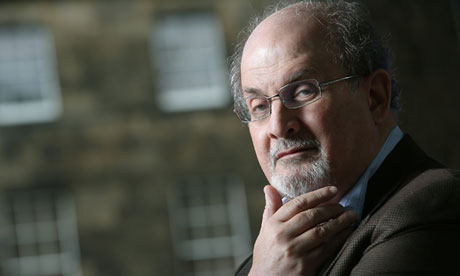Speaking at Edinburgh international book festival, author gives insight into years he was forced to live under police protection
Sir Salman Rushdie at the Edinburgh international book festival. Photograph: Jeremy Sutton-Hibbert/Getty Images
Nine years living in hiding after a fatwa was issued against him may not sound like a particularly merry experience, but Sir Salman Rushdie has said his period in police protection felt at times like "a comedy routine".
On leaving a dinner at the London home of fellow novelist Hanif Kureishi, he recalled that "one of the police officers left his gun behind. And for Hanif of course this was like a transcendent moment of joy. He ran out into the street, holding the gun by the barrel, shouting, 'Here, you forgot your shooter!'"
On another occasion, Rushdie said, a trip to rural Ayrshire led to strife between the English and the Scottish special branch about who should take charge, resolved by officers from both squads turning up.
"We were in this rural cottage in remote Ayrshire and there was this arsenal of armoured Jaguars parked outside. The hard thing was not concealing me, it was concealing them … there was this police convention going on."
The author was speaking about his third-person-narrated memoir, Joseph Anton (his pseudonym under the fatwa, after the first names of Conrad and Chekhov), at the Edinburgh international book festival.
He had no premonition of the storm that would greet the publication of The Satanic Verses, he said, when Ayatollah Khomeini issued a fatwa of death against him in 1989 – an event that led to the killing of one of Rushdie's translators, the serious injury of another, and bombings of bookshops.
"International terrorism levelled against translators, publishers and writers wasn't something that we knew about. People who were conservative Muslim believers had not liked any of my books, so I expected them not to like it and my view was, 'So what?' In general if you don't want to read a book then don't: that's why there are all these books in bookstores for you to chose from. If you start reading a book and you don't like it you always have the option of shutting it. At this point it loses its capacity to offend you."
He added: "I do think one of the characteristics of our age is the growth of this culture of offendedness. It's got something to do with the rise of identity politics, where you are invited to define your identity quite narrowly … What's happened in this age is we are asked to define ourselves by hate."
More
On leaving a dinner at the London home of fellow novelist Hanif Kureishi, he recalled that "one of the police officers left his gun behind. And for Hanif of course this was like a transcendent moment of joy. He ran out into the street, holding the gun by the barrel, shouting, 'Here, you forgot your shooter!'"
On another occasion, Rushdie said, a trip to rural Ayrshire led to strife between the English and the Scottish special branch about who should take charge, resolved by officers from both squads turning up.
"We were in this rural cottage in remote Ayrshire and there was this arsenal of armoured Jaguars parked outside. The hard thing was not concealing me, it was concealing them … there was this police convention going on."
The author was speaking about his third-person-narrated memoir, Joseph Anton (his pseudonym under the fatwa, after the first names of Conrad and Chekhov), at the Edinburgh international book festival.
He had no premonition of the storm that would greet the publication of The Satanic Verses, he said, when Ayatollah Khomeini issued a fatwa of death against him in 1989 – an event that led to the killing of one of Rushdie's translators, the serious injury of another, and bombings of bookshops.
"International terrorism levelled against translators, publishers and writers wasn't something that we knew about. People who were conservative Muslim believers had not liked any of my books, so I expected them not to like it and my view was, 'So what?' In general if you don't want to read a book then don't: that's why there are all these books in bookstores for you to chose from. If you start reading a book and you don't like it you always have the option of shutting it. At this point it loses its capacity to offend you."
He added: "I do think one of the characteristics of our age is the growth of this culture of offendedness. It's got something to do with the rise of identity politics, where you are invited to define your identity quite narrowly … What's happened in this age is we are asked to define ourselves by hate."
More

No comments:
Post a Comment